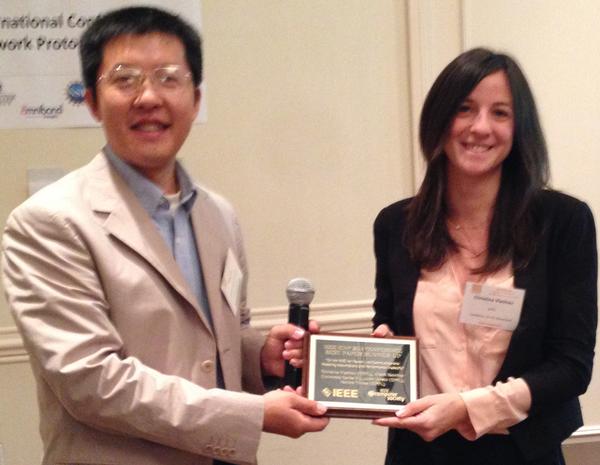Best Paper Runner-up Award for Christina Vlachou and team

Christina Vlachou, Albert Banchs, Julien Herzen and Patrick Thiran won the Best Paper Runner-up Award at ICNP, the IEEE International Conference on Network Protocols.
Christina Vlachou (EPFL), Albert Banchs (Universidad Carlos III de Madrid, Spain), Julien Herzen (EPFL) and Patrick Thiran (EPFL – Professor at the IC School) won the Best Paper Runner-up Award at ICNP, the IEEE International Conference on Network Protocols. This is one of the premier conferences covering all aspects of network protocol research, including design, analysis, specification, verification, implementation, and performance. ICNP 2014 was held in the Research Triangle area of North Carolina in October.
The paper is called “On the MAC for Power-Line Communications: Modeling Assumptions and Performance Tradeoffs”.
The team has proposed new mathematical models, which allow understanding and improving the performance of PLC networks. The researchers are also developing new techniques that can combine several different technologies, such as Wi-Fi and PLC, to improve network performance.
Here is the abstract of the paper:
Power-line communications are becoming a key component in home networking. The dominant MAC protocol for high data-rate power-line communications, IEEE 1901, employs a CSMA/CA mechanism similar to the backoff process of 802.11. Existing performance evaluation studies of this protocol assume that the backoff processes of the stations are independent (the so-called decoupling assumption). However, in contrast to 802.11, 1901 stations can change their state after sensing the medium busy, which introduces strong coupling between the stations and, as a result, makes existing analyses inaccurate. In this paper, we propose a new performance model for 1901, which does not rely on the decoupling assumption. We prove that our model admits a unique solution. We confirm the accuracy of our model using both testbed experiments and simulations, and we show that it surpasses current models based on the decoupling assumption. Furthermore, we study the tradeoff between delay and throughput existing with 1901. We show that this protocol can be configured to accommodate different throughput and jitter requirements, and we give systematic guidelines for its configuration.
Further information on http://icnp14.cs.unc.edu/program.html.
